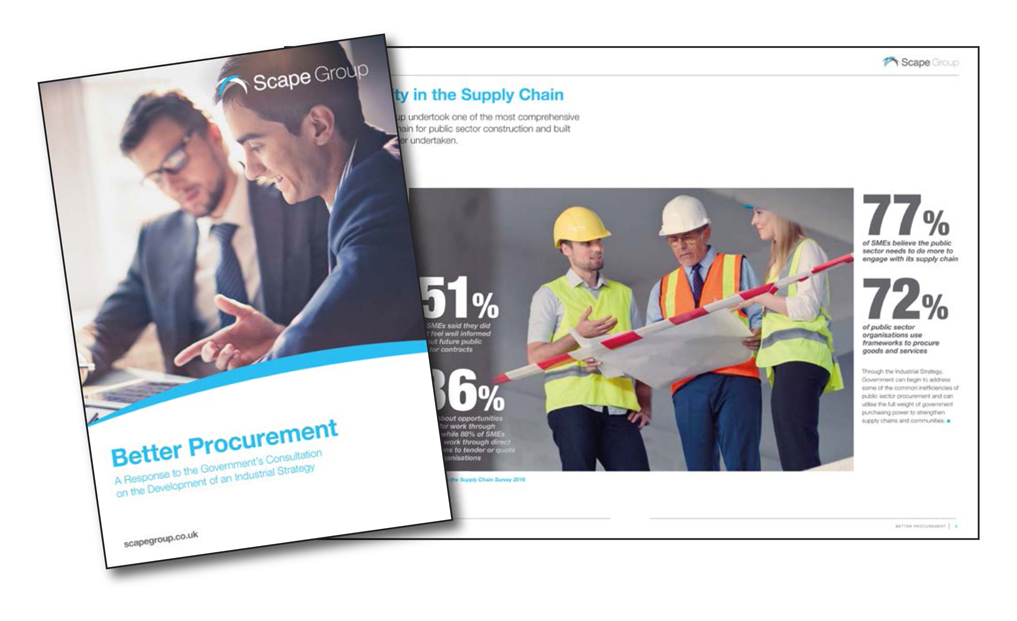
Public sector procurement specialist, Scape Group, has called on politicians to reform the UK’s procurement rules in order boost local economies and deliver greater social value for communities through public contracts.
In doing so, government could unlock up to £14.4bn for regional supply chains, including £3.4bn for the construction industry, according to Scape’s analysis of public sector contracts. Each year the Government spends £268bn on procurement, equivalent to 14% of UK GDP.[1]
Scape, whose framework partners include industry leaders Balfour Beatty, Kier, Willmott Dixon, Carillion, Wates and Lendlease, has set out its response to proposals in the Government’s pre-election Green Paper, Building Our Industrial Strategy. In its report, Better Procurement, Scape has published four key recommendations to boost local supply chains, help cut down unnecessary bureaucracy for SMEs, and drive up innovation and quality through best practice procurement in the public sector. They include:
- A clearer definition of Social Value and a 20% minimum on public sector projects and contracts over £10m.
- A new ‘By Appointment to HM Government’ title for public sector suppliers to encourage SMEs to bid.
- A Government-led Best Practice Guide for Public Sector Procurement.
- Further streamlining and standardisation of procurement processes and tendering requirements.
Mark Robinson, Scape Group Chief Executive, commented: “Politicians on all sides agree that SMEs are the lifeblood of our economy and post-Brexit trade. However the reality of minority government and a parliament blocked up with Brexit legislation means there is now a huge risk that the Industrial Strategy is watered down and major infrastructure projects like Heathrow or HS2 are delayed. We cannot afford to miss the opportunity to level the playing field for SMEs or invest in regional economies.”
Social Value — £14.4bn for local supply chains and communities
To maximise the economic benefit of every Pound spent by the public sector, Scape is calling for a clearer definition of ‘Social Value’ with a focus on local spend and local employment and training. Its report calls for all public sector procurements over £10m across all sectors to deliver at least 20% Social Value.
Each year the Government spends £268bn on procurement, equivalent to 14% of UK GDP.[2] According to Scape’s analysis of public sector tenders, £72bn was spent on projects and contracts over £10m, including £16.8bn on construction and built environment services.[3] If Scape’s proposed 20% minimum on contracts over £10m was implemented across all Government procurement spending, this could mean £14.4bn of spending each year directed to local economies, and £3.4bn from construction projects alone.
If this approach was implemented on major capital investment projects such as HS2, local supply chains and economies could benefit by up to £11.2bn over the lifetime of the project, while the Government’s Road Investment Strategy (RSI1) could mean over £2.3bn in social value and local spend.
Mark continued: “The Industrial Strategy must prioritise the strengthening of local supply chains and regional economies, as this is the fastest way to create high skilled jobs and boost productivity. The Government’s enormous clout on procurement has the potential to rebalance the economy and support our SMEs. Scape’s own frameworks have achieved 50% local spend within 20 miles of over 2,400 construction and built environment projects, equating to £1.6bn for local suppliers. We already know that it is possible to achieve high levels of social value and local spend, so the Government should now look to set a 20% minimum on projects over £10m. In time, they should go further.”
‘By Appointment to HM Government’ — A new award for SMEs
A new title should be awarded to suppliers to the public sector, styled on the Royal Warrant, in order to create a ‘mark of quality’ for SMEs to aspire to, according to Scape. This recognition would be attractive to small businesses, while the Government would be able to set criteria that would encourage greater innovation and quality.
Scape’s 2016 Sustainability in the Supply Chain Report revealed that 51% of SMEs did not feel well informed about future public sector contracts, and 77% of SMEs believed the public sector needed to do more to engage with its supply chain.
Scape is also calling for government to provide clear-cut guidance, advice and support for SMEs on public sector procurement, including how to form effective consortia and create a social value strategy. A national strategy on procurement best practice would also help to raise standards across all public sector organisations and frameworks.
Mark addsed “As we leave the EU, there is an opportunity to take the best practice approach of OJEU’s procurement rules and create a new UK procurement framework that delivers maximum value for the UK economy and local communities. But there are also many practical steps we can take right now to simplify procurement processes, support local supply chains and deliver real jobs and training. Better, smarter public sector procurement must be a top priority for policy makers.
“Government has a role to play in creating a successful model for good public sector procurement and this is something that must be addressed in the Industrial Strategy. Public sector procurement should be simple and straight-forward, with minimal overlap. That is the way to get Britain’s SMEs embracing public contracts and driving innovation.”
Scape Group’s response to the Building Our Industrial Strategy Green Paper, Better Procurement, is available at www.scapegroup.co.uk/research.
[1] Building our Industrial Strategy Green Paper, 2017, p. 71.
[2] Building our Industrial Strategy Green Paper, 2017, p. 71.
[3] Scape Group analysis of data available via www.gov.uk/contracts-finder.








